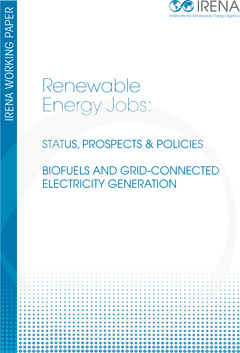20 April 2012
 As governments seek new ways to address the dual challenge of high unemployment and increasing carbon emissions, there has been growing interest in the potential for the renewable energy industry to create jobs. A working paper from the International Renewable Energy Agency (IRENA), titled Renewable Energy Jobs: Status, Prospects & Policies, aims to provide an overview of current knowledge on five questions related to grid-connected electricity generation technologies and biofuels:
As governments seek new ways to address the dual challenge of high unemployment and increasing carbon emissions, there has been growing interest in the potential for the renewable energy industry to create jobs. A working paper from the International Renewable Energy Agency (IRENA), titled Renewable Energy Jobs: Status, Prospects & Policies, aims to provide an overview of current knowledge on five questions related to grid-connected electricity generation technologies and biofuels:
- How can jobs in renewable energy be characterized?
- How are they shared out across the technology value chain and what skill levels are required?
- How many jobs currently exist and where are they in the world?
- How many renewable energy jobs could there be in the future?
- What policy frameworks can be used to promote employment benefits from renewable energy?
Latest estimates from the Renewable Energy Policy Network for the 21st Century (REN 21) place renewable energy employment at 3.5 million jobs, the majority of which are located in China, Brazil, Germany, India, and the United States. One of the key drivers for renewable energy job creation is the presence of some kind of policy target or support policy for renewable energy that specifically identifies job creation as a goal, such as feed-in tariffs, quota obligations, favourable tax treatment, and public loans.
According to the working paper, renewable energy is associated with net job creation, and the success of job creation depends on a range of factors including: success of deployment, industrial and labour policy, ability to take advantage of export markets, and the multiplier effects of deployment on the rest of the economy. The following seven key lessons for policymakers are identified:
- Caution is needed in relying on existing data
- There is significant potential for net job creation
- There are job opportunities across the whole value chain
- Job creation is one of the reasons that speak in favour of renewable energy
- Sustainable job creation depends on stable and predictable deployment policies
- Industrial policy will influence the jobs that are created
- Increased training and education in renewable is crucial
The most important finding for policymakers is that it is widely accepted that countries with stable policy regimes have seen the most success in deploying renewable energy and consequently creating jobs. Strong, stable, transparent, and credible national policy is the single most significant driver of private sector investment in renewable energy. Policymakers can facilitate this investment through renewable energy targets, adequate institutions, minimization of non-economic barriers, and addressing economic barriers through measures such as financial support for renewable technologies, carbon dioxide pricing, and elimination of subsidies for conventional power generation.
